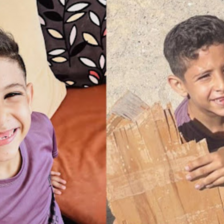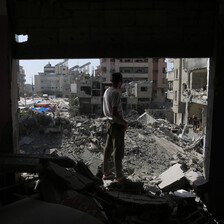The Electronic Intifada 15 July 2025

Eqraa Ketabak in the Nuseirat camp.
Amid Gaza’s devastation, signs of life reappear in the most unexpected places.
Eqraa Ketabak (Read Your Book) is a small book stall that opened in late April right in the middle of the destruction in the Nuseirat refugee camp in the central Gaza Strip.
Rows of Arabic and English novels, poetry, philosophy, faith and self-help books are laid out neatly on makeshift wooden planks on the pavement, their colorful covers defying the gray dust of destruction around them.
Surrounded by buildings partially or fully collapsed and debris from old and recent airstrikes, the books and their subject matter seem incongruous. With titles that speak of hope, of love, loss and resistance, as if reflecting the emotions etched into the faces of passersby, the stall invites them to pause, read and reconnect with a part of life that genocide has tried to erase.
“Books take their place amidst the ruins,” Hassan al-Qatrawi, a Palestinian novelist, academic and a regular customer at the stall, wrote on his social media account. “They [the Israelis] destroy us from the outside, and we build ourselves from within. The hunger for food is temporary. But the hunger for reading is eternal.”
Behind the modest book stall are two young brothers from the Nuseirat camp. Salah and Abdullah Sarsour lost their home during the genocide and were displaced to a nearby school where they still shelter.
They developed a passion for books at a young age and during the now 21-month-long Israeli war of extermination in Gaza, they have not stopped reading, despite all the hardships. Although accessing books is difficult, Abdullah insisted on taking long, difficult trips to northern Gaza, risking his safety and spending a lot of money on transportation to find a good read in book shops like the iconic Samir Mansour bookshop in Gaza City.
Sharing a passion
But others, even if less dedicated, wanted books too.
“It wasn’t just about us,” Abdullah told The Electronic Intifada. “We knew others in our camp who loved to read too, but not everyone could make the journey.”
So instead of going back and forth, the brothers instead decided to bring the books to their community. If people can no longer get to the books, then the books must come to them.
They pooled their savings and bought a first, large batch of books from the north in order to launch their modest stall. Their goal was not to make money, they said, but to enable access, to make reading easier and more commonplace.
“It is about sharing our passion with people, not just starting a business,” Salah said. “We wanted to encourage people to read again.”
According to the Palestinian Central Bureau of Statistics, the illiteracy rate in Palestine is one of the lowest in the world.
In Gaza it is just under two percent
Most Palestinians in Gaza pride themselves on their deep love of reading. Despite being deprived of education for almost two years due to the ongoing genocide, they have never stopped reading, writing or learning even under these catastrophic circumstances.
Eqraa Ketabak has quickly become more than a place to buy books. It has become a space for conversations, for children to flip through stories and make up for the years of study they have lost, for elders to rediscover forgotten poems they once memorized by heart, and for writers to find inspiration to write their own stories and books.
Solace
Amal Abu Saif is a Palestinian writer who finds solace in books.
“Whenever I feel overwhelmed, I run from this world to another through books,” Amal told The Electronic Intifada. “This book stall has become my priority destination and the only place that makes me feel my old self again.”
Amal believes that reading and writing are her only way to resist. Following the lead of the late, renowned poet Mahmoud Darwish – who believed that writing by the oppressed was a form of resistance – Amal has recently published her first novel, Atheer Gaza, or Beloved Gaza.
“We were displaced in a small tent. There was nothing to do, no universities, no classes, just endless days searching for food and water, and cooking over firewood,” Amal said. “One day, I told myself, how long will I stay waiting in this way? No, I want to achieve something. I want to make a difference.”
In January 2024, she began documenting her daily experiences and suffering using the notes app on her phone. Paper is scarce and extremely expensive. At first, she wrote only a little at a time. But months later she returned to those notes, expanded them, and turned them into a full novel.
By July, it was published. Today, her book is available across the Arab world.
“It was a dream I’ve had for a long time,” Amal said. “And I’m counting the days until the war ends so I can print and publish my novel here in Gaza.”
As far back as April 2024, Israel’s wholesale bombardment in Gaza had left 13 public libraries damaged or completely destroyed, according to the UN. This is in addition to the mass destruction of educational institutions across the coastal strip of land.
The targeting of universities and schools, along with teachers and academics, is a clear indication that Israel is not only targeting buildings and infrastructure. It is an attempt to erase our history, silence our voices, and destroy the intellectual spirit of our people.
Yet, ideas don’t die.
And so long as there are ideas, there will be a need for books, as the brothers Sarsour will testify.
Esraa Abo Qamar is a writer in Gaza.




